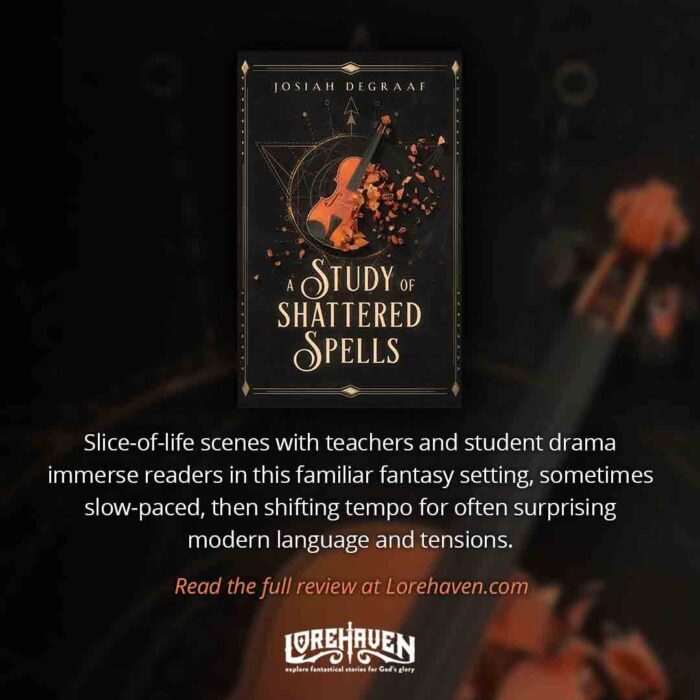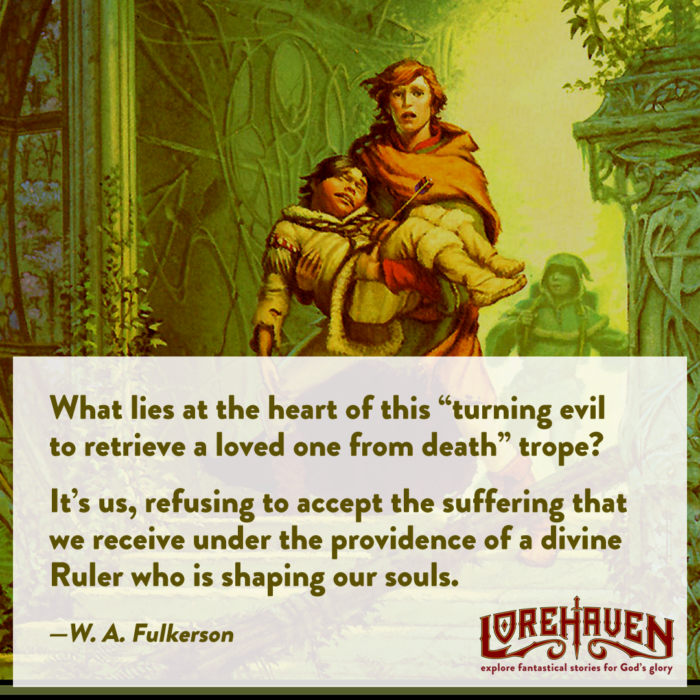How Fantasy Helps Us Fathom Human Suffering
Imagine an otherwise heroic character who refuses to move on after losing a loved one. This leads him into darkness among evil creatures he would otherwise never know. Why? Because he wants to bring back that person who made him happy.
This is a well-known if little-noticed trope, and the driving force behind Tad Williams’s sprawling, epic fantasy trilogy, Memory, Sorrow, and Thorn.
In this series, the newly coronated King Elias comes to rely on the counsel of a cruel, wicked priest named Pryrates who is deeply entangled in the occult. Why? Because years before, Elias’s beloved wife was killed in a raid. His faith (a semblance of Christianity called the Aedonite faith) offers him the comfort of God’s sovereignty and an eventual reunion in heaven, but the darkness offers King Elias a more immediate assurance.
Eventually, Elias makes his own body into a vessel for, essentially, a powerful demon. His action invites a crushing winter to fall across the world, bringing death, despair, and chaos—and an Unbeing that will destroy all life.
If we reject humility and suffering, we summon greater consequences
What lies at the heart of this “turning evil to retrieve a loved one from death” trope?
It’s us, refusing to accept the suffering that we receive under the providence of a divine ruler who is shaping our souls.
In Williams’s epic, Elias refuses the empathy, humility, and compassion that his tragedy should have brought him in time. Instead, he chooses bitterness, endless sorrow, and a dive into the darkness that could bring wintry death to everyone.
Such eternal winters are another fantasy novel trope. Before the White Witch brought her winter to Narnia, The Magician’s Nephew reveals this evil queen in the ruins of her own kingdom. Rather than accept the humility of not being completely sovereign, she caused the deaths of every person in her world. When Jadis enters Narnia, she brings with her a cold that destroys every joy and beauty the place had ever known.
We’re trying to play god
What causes a person to reject the suffering God uses to refine us?
The Epistle of James tells us to count it all to joy when we suffer, so we can learn perseverance. But our fallen human hearts tell us to eat from the Tree of Knowledge of Good and Evil, so that we do not need to suffer and be refined.
In short, King Elias is playing god. So is the White Witch. So are we.
What is playing god?
It is attempting to usurp God’s rule, abilities, and authority.
And what does a god get to do?
He gets to decide right and wrong. He creates the rules humanity will live under. Most importantly, a god gets to decide who lives and who dies.
Our tragic King Elias thinks his wife should not have died. He is willing to go to the darkest places and broker a deal with the devil to achieve his myopic vision of the world. This opens a terrible door to Unbeing, causing countless deaths, suffering, and unnatural winter.
When we try to play God, the whole world suffers
In our time, we do something similar: We abort hundreds of thousands of children each year—and according to Care Net, 40 percent of women who obtain an abortion had attended a church service within the previous four weeks.1
How is this like Elias?
Easy. We reject hardship and suffering, trying to choose who lives and who dies.
In our world, we see an increasingly unsteady economy, open corruption among our leaders, widespread riots, and 1984-style lockdowns. If we scratch our heads in wonder about the winter that is descending upon us, we would do well to remember our storybooks’ lesson:
When someone plays god, the whole world suffers.
Is this the Lord’s direct judgment, or the natural course of a society that refuses to protect the most vulnerable? Perhaps when we refuse to defend the innocent, our choice slowly erodes the dignity and goodness of everything else. I cannot say for sure.
We do know, however, that playing god didn’t work out for Adam and Eve.
Or Elias.
Or the White Witch.
Have humans ever won at such a game?
Memory, Sorrow, and Thorn at least offers some hope, as well as a challenge.
In Williams’s fantasy world of Osten Ard, a ragtag group of men and women bravely face insurmountable odds. They choose to oppose the king who opened the door to such evil, and in defeating him, they are able to restore the world to flourishing. Otherwise, Unbeing would have taken them all.
In the real world, we’ve tried to paper over a particular set of difficult situations since 1973. The door is open, the snow is gathering, and apathy will have dire consequences. Abortion not only kills a million children a year in this country. If we don’t defeat it, it will kill us all.
You see, we can’t stop at being miffed that someone out there is playing god. We must vigorously, tangibly, and effectively oppose this wickedness. Otherwise, the world will plunge back into darkness, and who knows when it can reemerge, if ever?
- “4 out of 10 women who had an abortion attended church at least once a month.” See Care-Net.org, undated page. ↩

































Excellent article!
I find stories that explore, in fantastical form, the consequences of hard-hearted choices to be among the most fascinating. The real-world examples are all too easy to discern. It’s a reminder to all of us – or should be – to leave providential arrangements of events to the only One who really controls our destiny.
Now let’s poke at this with a stick. How does this compare to things like Orpheus and Eurydice, or indeed, the Harrowing of Hell, a la the Catholics? What of Lazarus?
What are the motivations behind the necromantic curiosity? Behind even the selfish motivations are interesting and relatable feelings. Take our classic emotionally stunted emo sadboy Anakin Skywalker (like, in The Clone Wars because the movies don’t take the time to make this interesting). He has a list of psychological issues as long as my arm, but the Jedi Order pretty much set him up to fail because they expected him to repress everything. That’s some good stuff that gets you in the feelings, even if he loses all sympathy later by turning into an effin fascist.
What if your necro-curious character wants to take on the suffering of the deceased in order to bring them back to life? Isn’t that Jesus-like in that case?
But it’s a mental trip to realize that desperate people still went to the effort of making deals with Satan or the Fae, because even if they were gonna do something horrible to you, they had the reputation of at least delivering on what they promised, even if only to the letter and not the intent? It’s something about the irony of Satan/the Fae being seen as more dependable than God, even if slantwise. I’m 80% sure that there’s a folktale or operetta or something about some poor virtuous dweeb effectively tricking Satan out of a soul because their request on behalf of someone else was so unselfish that God could not allow them to go to hell?
The more I think about it, the more it seems that God calls is to journey in so many ways. The journey of the relationships with others, the journey through love, through grief (as discussed here), the journey to and through his will for us. From such truths come the disciplines of pilgrimage, of celebration, of repentance. Perhaps fantasy helps us see how that journey might work for us. The hero’s journey is uncomfortably close the journey we must all take.